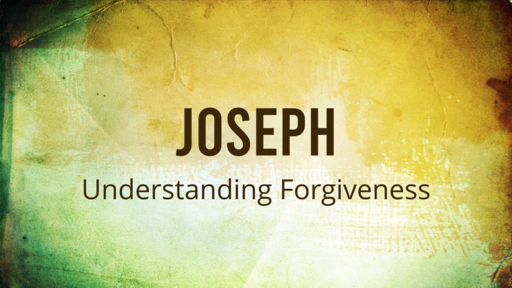Joseph: Understanding Forgiveness

Notes
Transcript
Sermon Tone Analysis
A
D
F
J
S
Emotion
A
C
T
Language
O
C
E
A
E
Social
Underdogs: The Greatest Comebacks. Week 1 we talked about David and we looked at the need for us to trust in God. Last week we looked at Daniel and the Need for Obedience. Today we want to finish our series on Underdogs and we’ll be talking about Joseph and the Need for forgiveness
For our key text today we’ll be in the book of Genesis chapter 45, and the first thing I need you to know is this:
Forgiveness does not depend on the Actions of Others
Forgiveness does not depend on the Actions of Others
Joseph believed God was in authority over every part of his life—even the difficult moments. Joseph’s jealous brothers stole his youth from him, selling him into slavery after they considered murdering him. Joseph was then carried off to another nation only later to be falsely accused and sent to prison. By the time we get to our key chapter for today, Joseph has been rescued out of prison and promoted to second man in all of Egypt, fulfilling the prophetic dreams he had as a child.
His brothers have shown up needing grain to survive the massive drought, and though they haven’t recognized him yet, Joseph knows it is them.
Then Joseph could not control himself before all those who stood by him. He cried, “Make everyone go out from me.” So no one stayed with him when Joseph made himself known to his brothers. And he wept aloud, so that the Egyptians heard it, and the household of Pharaoh heard it.
In this scene, he can no longer contain his emotions and has everyone leave the room except for his brothers. He was emotional to the point of tears at seeing his family
And Joseph said to his brothers, “I am Joseph! Is my father still alive?” But his brothers could not answer him, for they were dismayed at his presence.
here we see the truth of their actions......scripture says they were dismayed, and the truth is they were terrified.
Yet, he is quick to reassure them. The foundation of Joseph’s confident kindness is revealed by his crediting all his life’s events to God’s sovereign plan, saying,
And now do not be distressed or angry with yourselves because you sold me here, for God sent me before you to preserve life. For the famine has been in the land these two years, and there are yet five years in which there will be neither plowing nor harvest. And God sent me before you to preserve for you a remnant on earth, and to keep alive for you many survivors.
Joseph’s trust in God’s sovereign will and faithfulness to His promises enabled him to forgive his enemies. We need to understand that in order for us to become Overcomers instead of Underdogs, we will have to forgive, and that forgiveness begins not because of their actions but because of God’s. That leads to the second point.
Forgiveness God’s Will or Ours?
Forgiveness God’s Will or Ours?
Many believers become trapped in the idea that they should pray and ask God to help them feel like forgiving those who have hurt them. This kind of prayer is counterproductive and only prohibits actual forgiveness from taking place.
Corrie ten Boom said this about forgiveness
“Forgiveness is an act of the will, and the will can function regardless of the temperature of the heart” - Corrie ten Boom
Forgiveness happens at a specific moment in time in prayer with the Lord. The feelings will eventually follow, but the act of forgiveness is an event. A forgiveness prayer should say something like,
“Lord, I choose now in obedience to Your Word to forgive so-and-so for such-and-such. I release them from the debt they own me because You already paid for it with your precious blood on the cross. I forgive them, and I ask You to bless them.”
Our freedom found through forgiveness will benefit us and all those around us. We never know how God may use even our testimony of forgiveness to set others free. May we be able to look back and say because of our trust in God, “You meant for evil against me, but God meant it for good in order to bring about this present result, to preserve many people alive.”
“The more you rejoice in your own forgiveness, the quicker you will be to forgive others” - Tim Keller
Some of us cannot forgive others completely because we haven’t experienced the forgiveness of Father God through Jesus. When we truly understand His grace, we will want to share it with others
Closing
